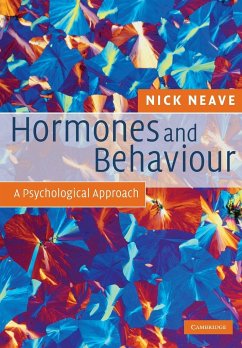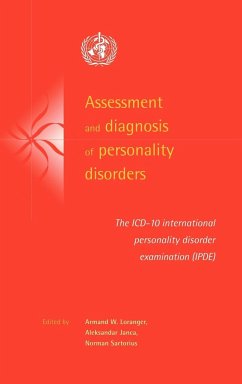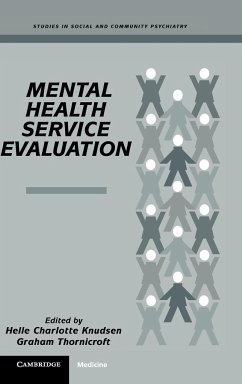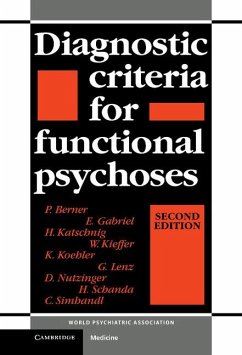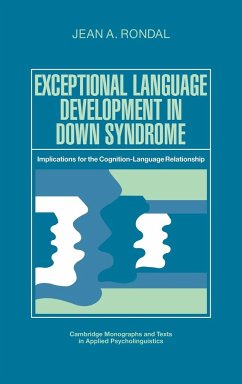
Early Prevention of Adult Antisocial Behaviour
Versandkostenfrei!
Versandfertig in 1-2 Wochen
120,99 €
inkl. MwSt.
Weitere Ausgaben:

PAYBACK Punkte
60 °P sammeln!
Examines the efficiency and cost-effectiveness of early prevention programmes on levels of adult antisocial behaviour.This book presents a comprehensive summary of how well adult crime, antisocial behaviour and antisocial personality disorder can be prevented by interventions applied early in life. It reviews important childhood risk and protective factors for these adult outcomes and the alternative strategies of primary prevention (targeting the whole community) and secondary prevention (targeting persons identified as high risk) are discussed. The book also contains extensive information ab...
Examines the efficiency and cost-effectiveness of early prevention programmes on levels of adult antisocial behaviour.
This book presents a comprehensive summary of how well adult crime, antisocial behaviour and antisocial personality disorder can be prevented by interventions applied early in life. It reviews important childhood risk and protective factors for these adult outcomes and the alternative strategies of primary prevention (targeting the whole community) and secondary prevention (targeting persons identified as high risk) are discussed. The book also contains extensive information about prevention programmes in pregnancy and infancy, pre-school programmes, parent education and training programmes, and school programmes (including the prevention of bullying). There is special emphasis on preventing the intergenerational transmission of antisocial behaviour by focusing on family violence, and a special review of whether risk factors and prevention programmes have different effects for females compared to males. Cost-benefit analyses of early prevention programmes are also reviewed, leading to the conclusion that adult antisocial behaviour can be prevented both effectively and cost-efficiently.
Table of content:
List of figures; List of tables; List of contributors; Preface; 1. Advancing knowledge about the early prevention of adult antisocial behaviour David P. Farrington; 2. Formulating strategies for the primary prevention of adult antisocial behaviour: 'high risk' or 'population' strategies? Jeremy W. Coid; 3. Risk factors for adult antisocial personality Rolf Loeber, Stephanie M. Green and Benjamin B. Lahey; 4. Preventing the intergenerational continuity of antisocial behaviour: implications of partner violence Terrie E. Moffitt and Avshalom Caspi; 5. Protective factors and resilience Friedrich Lösel and Doris Bender; 6. Prevention during pregnancy, infancy and the preschool years Richard E. Tremblay and Christa Japel; 7. Prevention through family and parenting programmes David Utting; 8. Prevention in the school years J. David Hawkins and Todd I. Herrenkohl; 9. Prevention of antisocial behaviour in females Deborah Gorman-Smith; 10. Economic costs and benefits of primary prevention of delinquency and later offending: a review of the research Brandon C. Welsh; 11. Conclusions and the way forward David P. Farrington and Jeremy W. Coid; Index.
This book presents a comprehensive summary of how well adult crime, antisocial behaviour and antisocial personality disorder can be prevented by interventions applied early in life. It reviews important childhood risk and protective factors for these adult outcomes and the alternative strategies of primary prevention (targeting the whole community) and secondary prevention (targeting persons identified as high risk) are discussed. The book also contains extensive information about prevention programmes in pregnancy and infancy, pre-school programmes, parent education and training programmes, and school programmes (including the prevention of bullying). There is special emphasis on preventing the intergenerational transmission of antisocial behaviour by focusing on family violence, and a special review of whether risk factors and prevention programmes have different effects for females compared to males. Cost-benefit analyses of early prevention programmes are also reviewed, leading to the conclusion that adult antisocial behaviour can be prevented both effectively and cost-efficiently.
Table of content:
List of figures; List of tables; List of contributors; Preface; 1. Advancing knowledge about the early prevention of adult antisocial behaviour David P. Farrington; 2. Formulating strategies for the primary prevention of adult antisocial behaviour: 'high risk' or 'population' strategies? Jeremy W. Coid; 3. Risk factors for adult antisocial personality Rolf Loeber, Stephanie M. Green and Benjamin B. Lahey; 4. Preventing the intergenerational continuity of antisocial behaviour: implications of partner violence Terrie E. Moffitt and Avshalom Caspi; 5. Protective factors and resilience Friedrich Lösel and Doris Bender; 6. Prevention during pregnancy, infancy and the preschool years Richard E. Tremblay and Christa Japel; 7. Prevention through family and parenting programmes David Utting; 8. Prevention in the school years J. David Hawkins and Todd I. Herrenkohl; 9. Prevention of antisocial behaviour in females Deborah Gorman-Smith; 10. Economic costs and benefits of primary prevention of delinquency and later offending: a review of the research Brandon C. Welsh; 11. Conclusions and the way forward David P. Farrington and Jeremy W. Coid; Index.








